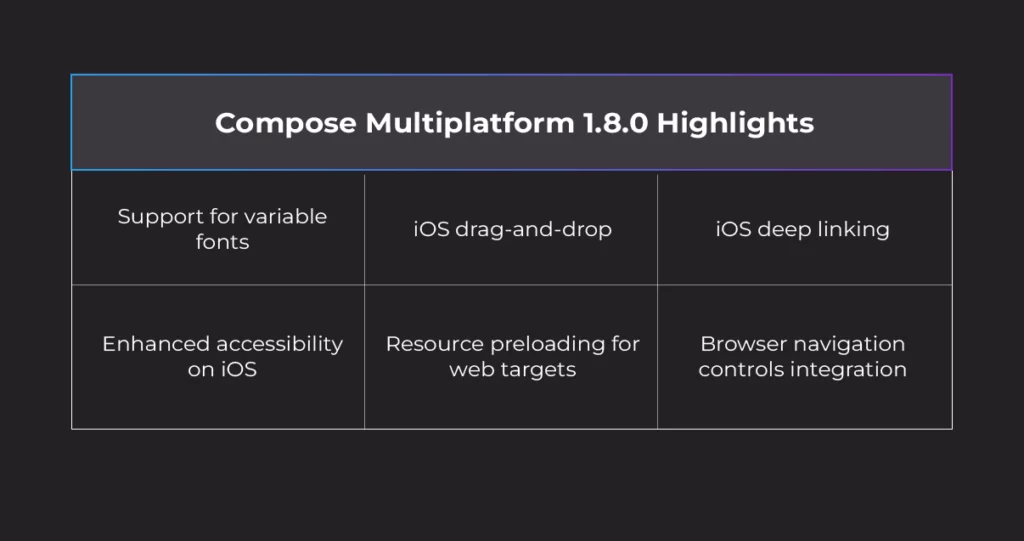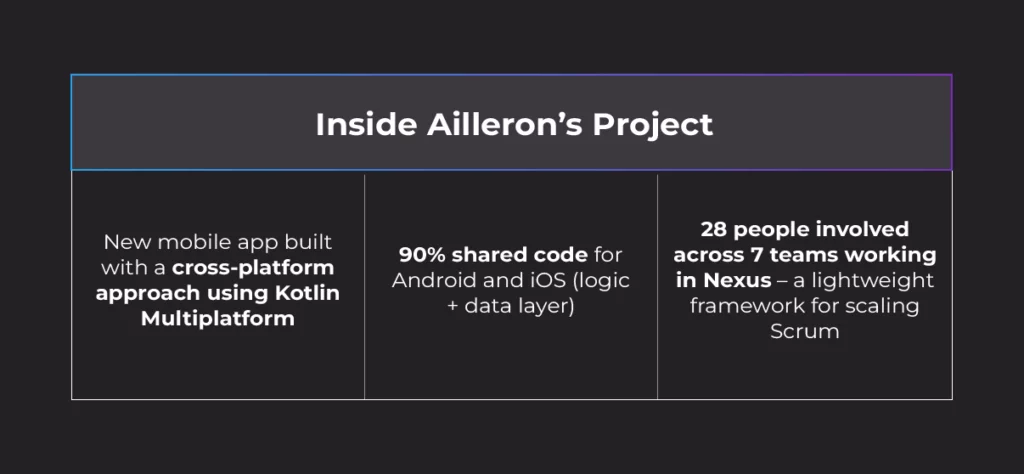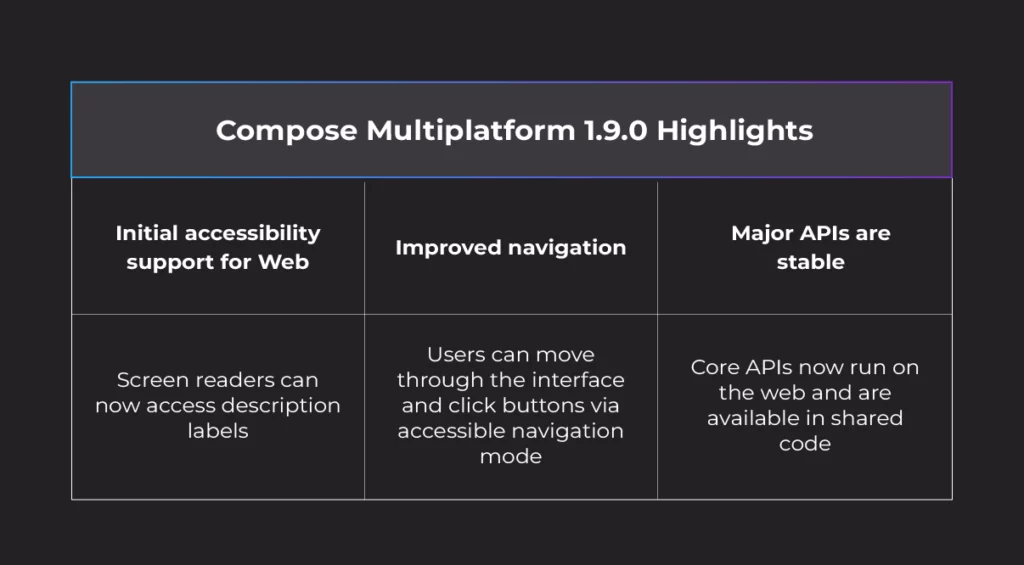By leveraging a shared Kotlin codebase, Compose Multiplatform is taking major steps forward in streamlining UI development across Android, desktop, and iOS. JetBrains is launching a series of upgrades that could fundamentally change the way projects are handled in terms of productivity and ease of code maintenance.
Table of Contents
- Compose for iOS Is Now Stable
- An Update That Helped Ailleron Run Its Project Smoothly
- How Compose Multiplatform 1.8.0 Impacts Developers?
- Compose Multiplatform 1.8.0 For Accessibility and WCAG Compliance
- Compose Multiplatform 1.9.0 for Web Is Now in Beta!
- Compose Multiplatform: One Codebase, Lower Costs, Greater Reliability
Compose for iOS Is Now Stable
With Compose Multiplatform 1.8.0, which introduces stable iOS support, Kotlin Multiplatform (KMP) is elevated into a comprehensive mobile solution. The new release enables teams to accelerate development, share code seamlessly between business logic and UI across Android, iOS, and desktop platforms, while preserving app quality and platform-specific features.
The 1.8.0 version marks a milestone: finalizes its core APIs, strengthens accessibility and navigation, provides bug fixes, and improves overall performance. Major APIs are now stable, and future-breaking changes are minimized. Jetpack Compose libraries are expanding with multiplatform capabilities, while the community continues to deliver high-quality libraries that cover everything featured in the official Kotlin Multiplatform catalog. With these essentials, developers can now build apps with reliable multiplatform user interfaces without compromising on native performance or flexibility.

Compose Multiplatform combines what’s best in native and cross-platform development. Version 1.8.0 enhances interoperability with SwiftUI and UIKit, enabling seamless embedding of Compose in existing apps or integration of native views into Compose screens, supporting gradual adoption and complete control over code sharing.
An Update That Helped Ailleron Run Its Project Smoothly

In a project delivered for one of Ailleron’s clients—a bank specializing in consumer and auto loans— aimed at building a new cross-platform mobile app, one of the biggest advantages of moving to Kotlin Multiplatform was the ability to share not just the application and domain logic, but also the data and presentation layers. With this upgrade, the team works on a single codebase, written once and maintained collectively.
In practice, the app developed under Kotlin Multiplatform reaches up to 90% shared code between Android and iOS in the areas of business logic and data handling.
The development team has already noticed clear benefits. Bugs appear far less often, since the shared code is easy to test—whether the tester is on iOS or Android, it’s often enough to test it on one platform. On top of that, implementation speed has grown significantly because each feature only needs to be built once.
What’s more, Compose Multiplatform is already fully aligned with modern declarative frameworks, empowering developers to build reactive UIs quickly and efficiently. Back when Android and iOS first appeared, even popular frameworks like Vue.js weren’t really designed with today’s complex, large-scale applications in mind.
Modern apps are not only bigger but also far more dynamic. Older frameworks demand a lot of extra work from developers to keep up with the expectations of today’s advanced user interfaces. With Compose Multiplatform, coding the UI feels fast, intuitive, and transparent—while the number of bugs drops dramatically.
There are still, however, native elements that appear—for instance, integration with third-party SDK providers or platform-specific features like biometrics or handling networking stacks. In those cases, the team switches to native development, which naturally differs between iOS and Android. Interestingly, these native fragments turned out to generate very few bugs, especially compared with the “old way” of writing code, where many more fixes and corrections were required.
Adopting this new approach made a clear difference for the team: the modern, shared code that runs seamlessly on both platforms is not only easier to work with but also higher in quality.
How Compose Multiplatform 1.8.0 Impacts Developers?
For serious applications—and that’s exactly what we are talking about here, meaning banking apps developed by organizations that care about their customers and are subject to strict regulatory requirements—it is crucial to operate on a stable and mature technology stack.
With release 1.8.0, Compose Multiplatform introduced a stable version for iOS. What does this mean in practice? Above all, it means the framework has been extensively tested, and the errors that might have appeared in earlier versions have been resolved.
Equally important is the transition from beta to stable, which effectively “freezes” certain parts of the framework’s code. It significantly reduces the risk of breaking changes in the future. In other words, once a feature is announced as stable, any potential modifications are communicated well in advance, migration paths are clearly defined, and the code no longer evolves at the same rapid pace.
While the framework was still in beta, updates arrived quickly, and developers had to respond immediately. There was no guarantee of stability, nor was there assurance that an application would still run without changes to APIs or developer interfaces after six months. Now, with stability guaranteed, application creators gain the confidence they need to build long-term solutions.
Compose Multiplatform 1.8.0 For Accessibility and WCAG Compliance
It’s also worth highlighting that with Compose Multiplatform 1.8.0, support for accessibility and WCAG compliance on iOS was introduced. What was the situation before? Accessibility-related features had been added gradually—such as screen reader support or access to the system keyboard—but they were fragmented. With release 1.8.0, all these inclusivity features were consolidated, making it possible to deliver a version that truly enables perceivable, operable, understandable, and robust digital experiences.
Another important aspect—always complex in mobile app development, regardless of the framework—is navigation, meaning how users move between screens and how data is managed. With release 1.8.0, this area has seen significant improvements. The navigation graph has become clearer and, most importantly, more secure. Developers can now transfer data between destinations in a type-safe manner and monitor user activity within the app while maintaining a transparent and accessible navigation history.
Compose Multiplatform 1.9.0 for Web Is Now in Beta!
In September 2025, JetBrains announced the Beta release of Compose Multiplatform for web, marking a big step forward in making the framework ready for real-world use by early adopters. Alongside the web Beta, the release of Compose Multiplatform 1.9.0 also brings improvements for Android, iOS, and desktop, highlighting how Compose Multiplatform is steadily evolving into a genuinely unified UI framework.

Compose Multiplatform: One Codebase, Lower Costs, Greater Reliability
Compose Multiplatform empowers financial institutions—banks, leasing companies, insurers, and more—to build user interfaces and business logic once and run them seamlessly on Android, iOS, and desktop. This approach delivers tangible benefits: reduced maintenance costs for multiple applications, faster rollout of new features, and fewer bugs thanks to unified testing. With stable iOS support and a Web beta version, Compose Multiplatform offers a powerful foundation for a long‑term digital strategy.

 Polski
Polski Deutsch
Deutsch





